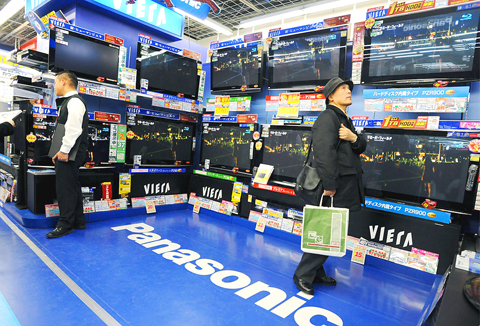Panasonic Corp plans to close three plants in Asia and axe hundreds of jobs as it braces to slip into the red for the first time in six years, a report said yesterday.
The Nikkei Shimbun said Panasonic — bruised by falling electronics prices and the yen’s rise — is expected to report a net loss of around ¥100 billion (US$1.1 billion) in the business year to March.
Mounting restructuring costs will also push losses higher, the daily said, without citing its sources.

PHOTO: EPA
Japan’s electronics giants are facing tougher times after enjoying several years of strong profits, as consumers tighten their purse strings amid recessions in major economies from the US to Japan and Europe. The rising yen has also eroded their export earnings.
Electronics maker Canon Inc said yesterday net profit dropped 37 percent last year and it forecast a further plunge of 68 percent this year because of the global economic crisis.
Canon, which produces cameras and office equipment, logged an annual net profit of ¥309.15 billion, against a year-earlier profit of ¥488.33 billion. For this year it expects a much lower net profit of ¥98 billion.
“The rapid deterioration in the economic environment since the autumn has triggered a global slump in individual consumption. This has caused damage to the digital camera market beyond our expectation,” Canon managing director Masahiro Osawa told reporters.
The Nikkei said Panasonic, which has enjoyed brisk sales of plasma televisions, mobile telephones and digital cameras in recent years, will close two of its three electronics parts facilities in Malaysia.
The two are the Malacca factory, which churns out film capacitors used in mobile phones, and a factory in the state of Selangor, which makes switches for audiovisual equipment.
Panasonic will close the Malacca plant in March with the loss of 500 jobs, it said. The Selangor plant would shut in September, it added, without saying what would happen to the employees there.
A Philippine facility that produces batteries will also be shut in March, with its 60 employees losing their jobs, it said.
Panasonic did not confirm the Nikkei report.
The company said it would announce whether it was revising its full-year forecasts next Wednesday when it releases October-to-last-month results.
In November, the company slashed its net profit forecast for the current financial year by nearly 90 percent, to ¥30 billion.
Panasonic said earlier this month that it would slash investment in flat TVs and exit unprofitable businesses to streamline its operations.

The US dollar was trading at NT$29.7 at 10am today on the Taipei Foreign Exchange, as the New Taiwan dollar gained NT$1.364 from the previous close last week. The NT dollar continued to rise today, after surging 3.07 percent on Friday. After opening at NT$30.91, the NT dollar gained more than NT$1 in just 15 minutes, briefly passing the NT$30 mark. Before the US Department of the Treasury's semi-annual currency report came out, expectations that the NT dollar would keep rising were already building. The NT dollar on Friday closed at NT$31.064, up by NT$0.953 — a 3.07 percent single-day gain. Today,

‘SHORT TERM’: The local currency would likely remain strong in the near term, driven by anticipated US trade pressure, capital inflows and expectations of a US Fed rate cut The US dollar is expected to fall below NT$30 in the near term, as traders anticipate increased pressure from Washington for Taiwan to allow the New Taiwan dollar to appreciate, Cathay United Bank (國泰世華銀行) chief economist Lin Chi-chao (林啟超) said. Following a sharp drop in the greenback against the NT dollar on Friday, Lin told the Central News Agency that the local currency is likely to remain strong in the short term, driven in part by market psychology surrounding anticipated US policy pressure. On Friday, the US dollar fell NT$0.953, or 3.07 percent, closing at NT$31.064 — its lowest level since Jan.

The New Taiwan dollar and Taiwanese stocks surged on signs that trade tensions between the world’s top two economies might start easing and as US tech earnings boosted the outlook of the nation’s semiconductor exports. The NT dollar strengthened as much as 3.8 percent versus the US dollar to 30.815, the biggest intraday gain since January 2011, closing at NT$31.064. The benchmark TAIEX jumped 2.73 percent to outperform the region’s equity gauges. Outlook for global trade improved after China said it is assessing possible trade talks with the US, providing a boost for the nation’s currency and shares. As the NT dollar

The Financial Supervisory Commission (FSC) yesterday met with some of the nation’s largest insurance companies as a skyrocketing New Taiwan dollar piles pressure on their hundreds of billions of dollars in US bond investments. The commission has asked some life insurance firms, among the biggest Asian holders of US debt, to discuss how the rapidly strengthening NT dollar has impacted their operations, people familiar with the matter said. The meeting took place as the NT dollar jumped as much as 5 percent yesterday, its biggest intraday gain in more than three decades. The local currency surged as exporters rushed to